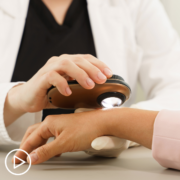When making advanced non-melanoma skin cancer care and treatment decisions, what factors help determine the best approach for YOUR disease? Dr. Soo Park reviews current treatment options, emerging research, and shares advice for partnering with your healthcare team.
Dr. Soo Park is a Medical Oncologist at Moores Cancer Center at UC San Diego Health. Learn more about this expert.
Related Resources:
Transcript:
Katherine:
Hello and welcome. I’m your host, Katherine Banwell. In today’s program, we’ll be discussing advanced non-melanoma skin cancer, what it is, how it’s treated, and you’ll learn tools for advocating for yourself.
This program is part of the Patient Empowerment Network toolkit series, which was created with the goal of helping patients learn more about their cancer and empower them to play a proactive role in their care. Before we meet our guest, let’s review a few important details. The reminder email you received about this program contains a link to program materials. If you haven’t already, click that link to access a guide to help you follow along during the webinar.
At the end of this program, you’ll receive a link to a program survey. Please take a moment to provide feedback about your experience today, in order to help us plan future webinars. And finally, before we get into the discussion, please remember that this program is not a substitute for seeking medical advice. Please refer to your healthcare team about what might be best for you.
Well, let’s meet our guest. Joining us is Dr. Park. Welcome. Would you please introduce yourself?
Dr. Park:
Great, thanks. So, my name is Sue Park, and I’m an associate professor of medicine at the University of California here in San Diego, and I focus on cutaneous oncology. So, I see patients with all types of skin cancers. And in particular, I focus on non-melanoma, because I think most patients realize that the other skin cancer that is widely known is melanoma.
Katherine:
Okay, that’s great. Thank you so much for dividing that up, and thanks for taking the time to join us today.
Dr. Park:
Yeah, of course.
Katherine:
So, Dr. Park, non-melanoma skin cancer is a group of cancers. Would you define it for us?
Dr. Park:
Yeah, so, non-melanoma skin cancers is just basically a broad blanket term for any skin cancer that is not a melanoma. And so, that’s things like basal cell skin cancer, squamous cell skin cancer, Merkel cell skin cancer. So, anything that’s not considered a melanoma. A melanoma is another type of skin cancer, but it develops from a different type of skin cell.
Katherine:
Okay, that’s good to know. So, what are the most common types of non-melanoma skin cancer? I think you’ve just mentioned that, but maybe you could mention them again, and maybe define each one.
Dr. Park:
Yeah, so, there are lots of different types of non-melanoma skin cancers, but the two most prevalent ones are basal cell skin cancer and squamous cell skin cancer, and they actually both come from the same cell of origin in the skin. but there are actually two different types of skin cancers because ultimately that one cell, develops into another cell.
And so, for basal cell skin cancer, the cell that it comes from is a basal cell, and that’s why it’s called basal cell skin cancer. And that is very different than squamous cell skin cancer. So, as the name says, squamous cell skin cancer actually comes from a squamous cell, and these are both cells that are in your skin, and both of these cancers are mainly driven by the sun exposure.
But even though they’re both non-melanoma skin cancers and they’re the most common, with basal cell being the number one most common skin cancer actually in the world, I think a lot of people don’t recognize that, because we don’t capture the occurrences of basal cell skin cancer very well, because it’s so common. But those are the two main types of skin cancers that I think a lot of treatments are focused on right now.
Katherine:
And are these cells – can they develop into cancer anywhere on the body, on the skin of the body?
Dr. Park:
Yeah, so, anywhere that you have any type of cutaneous skin, these cells reside, and typically they happen in areas where the skin is exposed to the sun. So, for example, they often happen on the head and neck, because we just get lots of sun exposure there.
Katherine:
Yeah, yeah, okay. So, who typically diagnoses this stage of skin cancer? Is it a dermatologist, or somebody else?
Dr. Park:
So, that really depends on the stage of the skin cancer. So, when I say stage, I mean how advanced is it. For an early stage skin cancer, those are typically really small. And oftentimes, patients will have a few of these; and some patients have a lot of these, maybe on their face, their neck, their scalp, across their hands and arms. And typically, they notice a small lesion that won’t go away or is getting a little bit irritated.
And so, they see the dermatologist first. So, the dermatologist is often the first person that sees patients whenever the patient has noticed like a small skin abnormality that’s not getting better. But sometimes, they also see patients that do not see the dermatologist first.
They actually either see a medical oncologist like myself, or a head and neck surgeon who I work closely with, because some patients have a tumor or a cancer that’s really large, and it’s too large to the point where a dermatologist is not able to offer them anything. And so, if the tumor is really large, that’s a later stage cancer. So, it’s not as stage.
Katherine:
Yeah. Now, this may seem like a silly question, but don’t the cells sometimes show up at like a mole, so you wouldn’t even know you had it?
Dr. Park:
Yeah. So, that’s more common for melanoma. It can show up as a mole, but you’re exactly right. For both non-melanoma skin cancers like basal cell and squamous cell skin cancer, it can look just like a little lesion that you might have thought you hit yourself on like the door handle, and it’s not getting better.
Some of these cancers actually appear, and then they go away on their own, and then they come back. And so, sometimes it’s really hard to see that it is a skin cancer, it was a skin cancer. But I think what’s really important is that it’s a lesion that’s either getting worse, or it’s not going away, so you should really tell your doctor about.
Katherine:
Yeah. We know that there’s a multidisciplinary team involved with advanced non-melanoma skin cancer care. Who are the members on the team?
Dr. Park:
So, I think now, because we have so many more treatments to offer patients, if I’m specifically talking about a non-melanoma skin cancer on the head and neck, which is where it most commonly occurs, because of sun exposure, I think the multidisciplinary team is really important. That typically consists of a medical oncologist like myself, typically a head-and-neck surgeon, and sometimes a plastic surgeon, as well, depending on what we come up with as a treatment plan.
It also often involves a radiation oncologist. So, that’s a special type of doctor that gives radiation treatment. We always want to keep the dermatologist involved, as well, because most of these patients do have a primary dermatologist that’s been really involved in their care.
Katherine:
What about other people on the healthcare team, like that are in a supportive form on the team?
Dr. Park:
Yeah, that’s just as important, because a lot of these patients may have barriers to care, or they may have social factors that affect their ability to get the care that they deserve, and that they need.
So, we work really closely with social workers, with nurse navigators, even speech therapists. Sometimes if the cancer is involving some really close to your lip or mouth, sometimes that can be really difficult. We work a lot with audiologists, as well. So, we have a really great multidisciplinary team.
Katherine:
So, once a patient has been diagnosed, what are the tests that help understand more about the patient’s individual disease?
Dr. Park:
So, it’s always important to get a biopsy, so then we can tell which type of non-melanoma skin cancer it is.
And that’s when we look at your cancer under the microscope, and a special doctor called a pathologist. And actually, they’re also really important as part of our multidisciplinary team. They look at the tumor under the microscope, and they help us decide and tell us which type of non-melanoma skin cancer it is.
But aside from that, I think imaging is really important. So, that are things like CT scans, MRI scans. Sometimes we have to also recommend a PET scan, which is another type of special scan. And these images are really to help us look deeper into the structure of your body, because I can only see so much from the outside.
And they can really help us tell how deep is the cancer; is the cancer around any critical structures? Is it anywhere else in the body? Because if we find cancer far away from where it originally occurred, that may tell us that the cancer is a later stage.
Katherine:
So, let’s just go with a scenario. Somebody comes in to you, and they have a lesion on their cheek, for instance.
Would you do a whole body MRI or a CT scan to see if that…once you’ve done a biopsy, you find that it’s cancerous. Would you do a whole body MRI, or a scan of some sort, to see if the cancer was anywhere else?
Dr. Park:
So, we typically don’t, because we know the patterns that – for instance, like you mentioned, like a skin cancer in your cheek can go to. And so, non-melanoma skin cancers on the face or anywhere in the body, they typically like to go to the lymph nodes that drain that area. And so, if you have a lesion on your face, that’s typically your neck.
And so, we’ll do a good exam of your face, your neck, but we will also get imaging of those areas. So, we typically get an imaging focused on the head and neck. If we find something abnormal there, then that may tell us we need additional imaging in the other parts of the body. But more often than not, we don’t start with a whole body scan.
Katherine:
Okay. What questions should patients ask about their test results?
Dr. Park:
So, I think patients should definitely ask, “What type of skin cancer do I have? How did it arise? Where all in my body is the skin cancer? What does my blood work look like?” And I think patients should also be aware that for many years now, we send tumor samples for something called molecular sequencing, and that just tells us different types of mutations that may be in your tumor. And that’s really important, because there are some drugs we have now that are only for patients that have specific mutations in their tumor.
And so, if you are one of those patients that has a specific mutation, that opens the door to another type of therapy for you. And, you know, that’s something that’s now recommended, actually, by a lot of cancer societies, to really send your tumor for some type of molecular sequencing, so we can level the playing field for all patients, and offer them the full range of treatments that we have.
Katherine:
Yeah. What are the common mutations?
Dr. Park:
So, for basal cell skin cancer, almost all basal cell skin cancers are driven by abnormality in a certain pathway called the hedgehog pathway. Yeah, I’m –
Katherine:
Interesting. Why?
Dr. Park:
It was named, I think, by someone. All these names are people by someone that discovered it, and they get the rights to name the pathway. But for a basal cell, it’s the hedgehog pathway. And so, in the hedgehog pathway, there are certain types of mutations specifically associated with that pathway. And one of them, among these mutations, we look for drugs that can inhibit this pathway. So, there are drugs that specifically target the hedgehog pathway.
They’re called hedgehog inhibitors, and they’re oral medications or pills that you can take every day. And those are for patients with basal cell skin cancer, because the basal cell skin cancer came about because the hedgehog pathway is not normal. But for squamous cell skin cancer, squamous cell skin cancer often has a lot of mutations. And unfortunately, they’re the type of mutations that we actually don’t have a drug for at this moment. But one unique thing about squamous cell skin cancer is that it has so many mutations.
And so, that means that it has a better chance of responding to a different type of treatment. It’s an IV treatment known as immunotherapy. And so, that’s something that’s relatively recent, I think, in the past five years now. We’ve started using immunotherapy for patients that have squamous cells skin cancer, and it’s worked remarkably well.
Katherine:
How do these cancers typically progress? What are the stages?
Dr. Park:
Yeah, so, if it’s just a really small cancer like that’s on your face, it’s typically an early stage or a stage I. And I’m specifically talking about squamous cell skin cancer, because actually for basal cell, we don’t have any formal staging for basal cell.
Katherine:
Why is that?
Dr. Park:
It just wasn’t included in the staging systems. So, for basal cell, there’s no formal staging criteria, but we’ll stage it as early stage based on what we think, as a clinician, when we see you; or if we get imaging and we see that it’s spread to other areas, it may be later stage. But for squamous cell skin cancer, it’s earlier stage depending on the size. Sometimes when we get a biopsy, and in the biopsy, if we find high risk things in the biopsy, that may actually put you at a higher stage, even if the cancer is somewhat small.
So, that could be like a stage III. But if at any point we find on imaging that the cancer has spread elsewhere – so, like you have a cancer that has spread to your liver, or to your lungs, or to the bones in your body, that’s a stage IV.
Katherine:
Okay. And when is the cancer considered advanced?
Dr. Park:
I think the cancer would be considered advanced if it’s not something that a surgeon can simply just remove. So, the dermatologist cannot just do a standard Mohs surgery, or the head-and-neck surgeon cannot just do a standard surgery, because advanced means that the cancer is either pretty deep, pretty large; or the surgeon can do surgery, but that means that the surgery would be very disfiguring. Sometimes these lesions can be really big on the face.
And sure, the surgeon could do the surgery, but if we have to take part of your eye, or part of your nose or your ear, and you have to have major reconstruction, that’s considered probably more of an advanced tumor.
Katherine:
Okay. As I mentioned, in this webinar, we’re focusing on advanced cancer. So, what is the typical treatment path for someone who’s been diagnosed at this stage of disease, at the advanced stage?
Dr. Park:
Yeah, so, before – and I really love this question, because in the past, we did not have that much to offer patients except surgery, and then they would get a very extensive surgery. They would get reconstruction. But sometimes it’s hard to get reconstruction after a really major surgery, because you have to heal, and you have to get better. And then, after the surgery, you would typically get radiation to try to prevent the cancer from coming back. But nowadays, we have immune therapy.
So, immune therapy is a certain type of IV medicine that’s not chemotherapy that works really well for squamous cell skin cancer. And so, nowadays, we can actually give this to you before surgery. So, we can give you a couple of doses of this IV immune therapy medicine before surgery, and really shrink your tumor quite dramatically.
And then, that makes the surgery a lot easier, smaller. And then, sometimes after we do the surgery, and then we look at what the surgeon has taken out under the microscope, we can’t see any tumor left. And that’s really amazing, because then sometimes we don’t even need to do radiation. So, not only did we make your tumor a lot smaller, sometimes we completely made it go away.
And then, if that happens, sometimes we don’t even need to do radiation. So, it really helps the patient. And I think this is really important, because this is somewhat newer data, and I still see patients that get referred to me for just surgery.
But I think a lot of head and neck surgeons are now aware of this data. And so, this is something that’s, I think, becoming more common.
Katherine:
What about targeted therapies?
Dr. Park:
So, targeted therapies are, I think, mainly used in basal cell skin cancer. So, targeted therapies are typically oral medications or pills. They’re called targeted, because they’re used in cancers that have a specific target. So, for example, the basal cell skin cancer, the target is the hedgehog pathway, because the hedgehog pathway is abnormal. And so, these pills, they specifically target the hedgehog pathway. But for squamous cell skin cancer, we don’t have any true targeted therapies.
Katherine:
As patients are reviewing their options with their doctor, what questions should they be asking about their care plan?
Dr. Park:
I think all patients should be asking, what the goal of the treatment is. They should be asking, especially if they’re being offered any type of treatment, what are the side effects? What can I expect from this, in terms of how much better will it make me? They should really ask about how often the treatments are given, because some patients have transportation issues or financial barriers, and we want to know about that, so we can help them.
Patients should also ask about any necessary blood work that is needed. They should ask what can they do in the future to prevent a similar type of cancer happening, and just make sure that they’re talking to their families, because I think social support is really important.
Katherine:
Yeah. I think it’s important for patients to ask how the cancer is going to impact their lives overall, really.
Dr. Park:
Yeah, exactly, because it will affect every single aspect of your life: your social life, your family life, your mental health, your physical well-being. And so, it’s really important to know and work with your doctor on what you think you can expect now, and also in the future.
Katherine:
Yeah. Well, how do test results impact treatment options, then?
Dr. Park:
So, there are sometimes when we have a skin cancer that actually happens inside a gland in your face. It’s one of the salivary glands in your face. And we sometimes don’t know if it’s a skin cancer that happened on the outside and that spread to the gland inside your face, or did it actually first just start inside the gland? Because a cancer that just starts inside the gland is not technically a skin cancer. It’s a different type of head-and-neck cancer, and it’s very, very rare, and it’s treated very differently.
So, nowadays, because we have that molecular testing, like I talked about, I see lots of patients where they have a cancer in their salivary or parotid gland. We don’t know where it came from. And so, we send it for molecular sequencing or molecular testing, and there are certain clues in the molecular testing that can tell us, oh, it probably actually came from a skin cancer.
You just didn’t know it; or maybe it’s the skin cancer that kind of was there and went away; or maybe it was a skin cancer you had like five years ago, that you didn’t think caused any problems, but it did spread, because knowing where it came from through molecular sequencing, if it’s really hard to find out where, really impacts the treatment I may give you.
Katherine:
Dr. Park, we’ve been hearing a lot about innovation technology, or we’ve been hearing a lot about innovations in technology. How are these advances improving skin cancer care?
Dr. Park:
They’re approving care, because we can offer patients more minimal procedures. We can tell them you don’t need this type of other treatment, and you can have the same outcome. So, we can tell you need less treatment, and the outcomes are just as good, because sometimes more treatment is not always better. More treatment sometimes means more toxicity, more time away from family, more time away from home. Advances mean that we can keep you cancer-free for longer.
Or even if I can’t ever get rid of the cancer, we have drugs that can keep it under control for a long time, and it stays under control, even if I stop the medicine. So, all those are really remarkable things for our patients, that we have options that can help them live healthy, full lives.
Katherine:
How do you know if a treatment is working? How is a patient’s response monitored?
Dr. Park:
For skin cancer, that’s pretty easy, and I think that’s one of the most satisfying things, because I can often see the cancer visibly. I don’t always have to rely on a scan, as for some patients for the cancers in their stomach or something like that. So, patients will often see a dramatic reduction in the size of their tumor, sometimes even after the first treatment I give them. And not only can we tell by looking at them; eventually, I will get a scan to compare it to the scan they had it in the first place, and we see that the tumor has gotten a lot smaller.
Katherine:
That’s good news. What about side effects of these therapies? How are they managed?
Dr. Park:
Yeah, so, for immunotherapy, there’s one specific side effect that we don’t find with chemotherapy, and that’s really when your body’s own immune system kind of ends up attacking the other parts of your body. And so, it can cause inflammation of other organs. And so, for patients that experience that, it can be very mild, and it can be all the way to very severe, requiring a patient to go to the hospital.
But in all cases, we just have to tell the immune system to quiet down a bit, because it’s attacking your body. And so, the way we do that is we give the patient steroids. And so, if it’s really mild, maybe you have like a small rash; maybe we can just give you a steroid cream, or maybe we have to give you a steroid pill. But sometimes, if it’s really severe, we have to tell you to go to the hospital so you can get steroids through your IV.
Katherine:
Okay. Beyond what has been approved to treat advanced non-melanoma skin cancer, where do clinical trials fit in?
Dr. Park:
Clinical trials are great, because they’re the reason why we have the drugs that we have today that are working so effectively. And so, I’m really fortunate to be at a center where we offer clinical trials for patients.
Clinical trials always fit in at any point in the journey, as long as they fit your disease. So, most of the clinical trials we have are for patients that have advanced disease, not for early stage, because the early stage patients don’t really need it; because with just simple surgery, they tend to do really well, and their cancer doesn’t really ever come back and cause issues.
But clinical trials are really important, because they’re the only way we can study a promising treatment option; see how well it works, and if it works really well, then move it further on to hopefully help a lot of other people. And that’s why we have immunotherapy today – is through clinical trials; and immunotherapy is used for lots of cancers.
Katherine:
It is, yes. Are there barriers to accessing trials? And if so, do you have any recommendations on how to tackle them?
Dr. Park:
Yeah, there are barriers to trials, and I think the thing that the cancer community is really trying to work on is barriers to accessing trials if you’re from an underrepresented population in medicine. So, based on your socioeconomic status, meaning how much money do you make or what your education level is, what race are you, what ethnicity, what is your background; because we know that there’s a disparity for those individuals. And so, I think really asking your doctor, staying curious; asking them, “Could a clinical trial help me?”
Even if you have no idea of really what trials there are, or what they really mean, you can just throw that word out; and that then, the doctor knows that you’re potentially interested, and they can actually give you the information and help you learn more about it, even if you don’t know much about it; because I think it’s still quite a black box, and we’re trying to overcome this barrier, but it’s difficult.
Katherine:
And what about researching clinical trials online? What sites would you recommend?
Dr. Park:
So, I have to admit that there are multiple sites, but sometimes they are not very patient-friendly. Even whenever I look at them, they are not very friendly. I think the largest repository of clinical trials is the NCI database. It’s just where every clinical trial that’s open has to be registered, and it’s run by the federal government, I believe. And because it’s not super regulated, it’s just the person working on the trial entering information, and they’re typically of a medical background, sometimes the information is not very easy to digest or understand.
So, I think really just letting your medical team know that you might be interested in a trial, then they can help you find the right trial for you. And if they don’t have one, they can tell you other areas or other centers that might have one. You are more than welcome to go search in Google and all that, but it can be really hard, and then I don’t want that to make the patient feel that this is not for them.
Katherine:
Right, right. Are there any recent research highlights that you could share with the audience?
Dr. Park:
Yeah, so, one thing that just recently came out is that – so, squamous cell skin cancer is actually a lot more common and a lot more aggressive in patients that have an organ transplant. So, I’m talking about patients that have a kidney transplant, or a liver transplant, or heart transplant.
But the problem is, I can’t really give them immune therapy like I can somebody else that does not have a transplant, because like I said, sometimes one of the side effects of the immune therapy is that it can attack other parts of your body. And so, for patients that have an organ transplant, one of the risks, if I did give them immune therapy, is that it would actually attack their organ that they got from somebody else.
And except for kidney, because we have dialysis: if I injure that organ, I don’t really have much else, and that does not bode well for the patient. But now, they’re trying to really figure out ways we can actually combine immune therapy with steroids in different doses to really see: can we actually help the patients that have organ transplants? Can we help their skin cancer? But then, can we also not injure their organ? And so, that’s something that a lot of research is being conducted on right now, and it’s really exciting.
That’s great information. Well, Dr. Park, as we wrap up, what would you like to leave the audience with, in terms of the state of advanced non-melanoma cancer care?
Dr. Park:
Yeah, I think as a patient, no matter your background, I think it’s just really important to be your own best advocate. And sometimes, that’s easier said than done. Some patients have families that can be advocates for them; but if you are by yourself, you can ask your doctor anything. You have the right to know, because it is your health and your body, and we do want to hear from you, because we do want to work with you to provide the best care that we can for you.
Katherine:
Dr. Park, thanks so much for joining us today. I really appreciate it.
Dr. Park:
Thanks so much, Katherine. It was a pleasure.
Katherine:
And thank you to all of our collaborators. If you’d like to watch this webinar again, there will be a replay available soon. You’ll receive an email when it’s ready, and don’t forget to take the survey immediately following the webinar.
It will help us as we plan future programs. To learn more about advanced non-melanoma skin cancer, and to access tools to help you become a more proactive patient, visit powerfulpatients.org. I’m Katherine Banwell. Thanks for being with us.


















